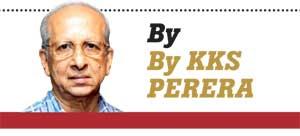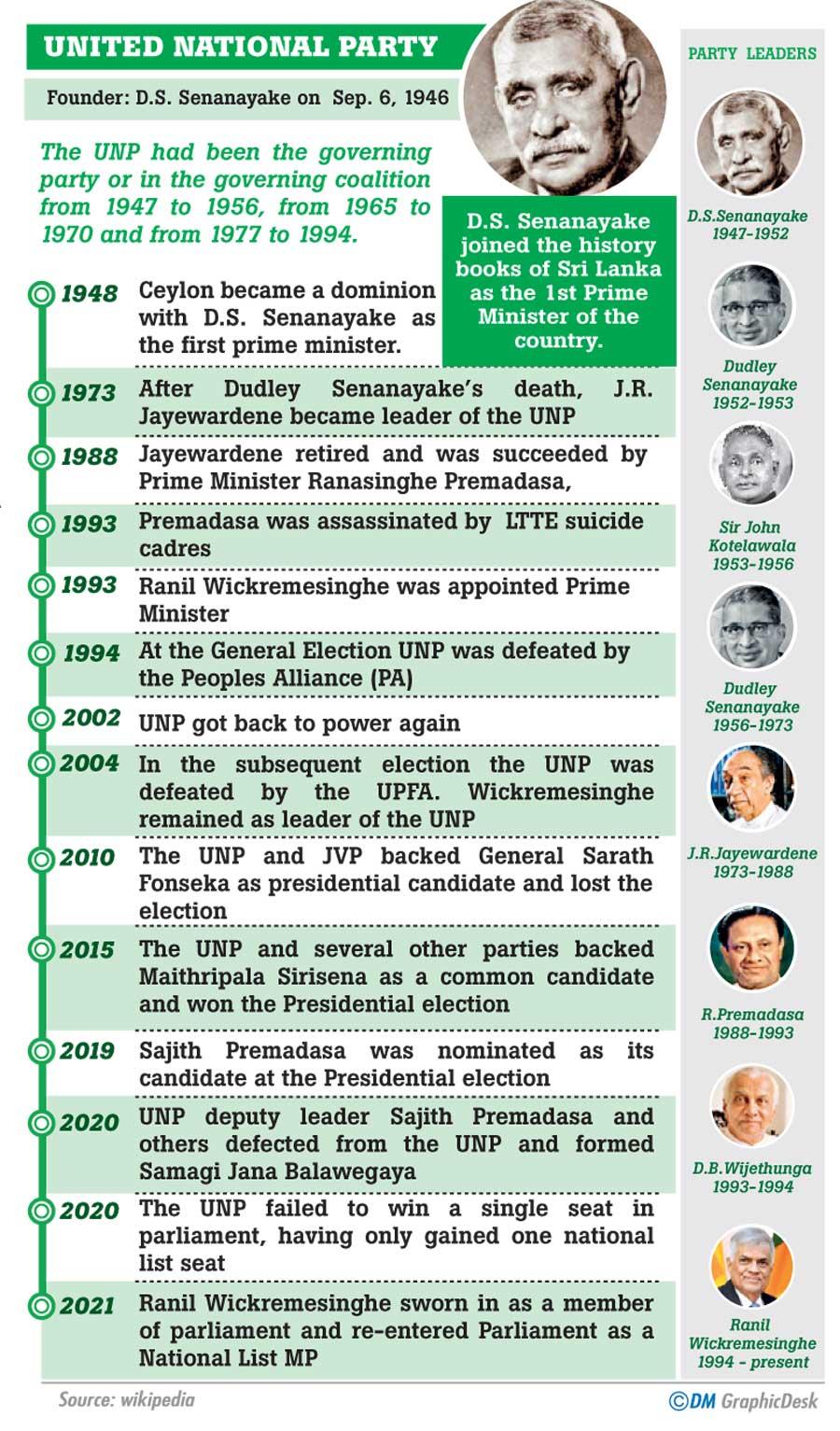Reply To:
Name - Reply Comment
Unite, before 75-year Journey Ends!
Date: Sep 6, 1946: Time: 5.00 pm: Place: ‘Palm Court’, Albert Crescent, Colombo 7. Col. John Kotalawala, welcomed those present and read the letter conveying the meeting. S. Nadesan, Member State Council for Kankesanthurai proposed, “This meeting resolves to form a political Party to be called the United National Party,”—it was seconded by T. B. Jayah, Muslim nominated member, State Council. SWRD Bandaranaike, minister of local government proposed the name of Don Stephen Senanayake as president, which was seconded by Member for Kandy, George E. de Silva. Kotalawala then invited DS Senanayake to occupy the Chair. A. F. Molamure, [former Speaker] proposed and A. R. A. Razik, second Muslim nominated member seconded the adoption of the draft constitution of the Party. The resolutions were carried unanimously. Dr. V. R. Schockman proposed a vote of thanks which was seconded by L. A. Rjapaksa KC.
welcomed those present and read the letter conveying the meeting. S. Nadesan, Member State Council for Kankesanthurai proposed, “This meeting resolves to form a political Party to be called the United National Party,”—it was seconded by T. B. Jayah, Muslim nominated member, State Council. SWRD Bandaranaike, minister of local government proposed the name of Don Stephen Senanayake as president, which was seconded by Member for Kandy, George E. de Silva. Kotalawala then invited DS Senanayake to occupy the Chair. A. F. Molamure, [former Speaker] proposed and A. R. A. Razik, second Muslim nominated member seconded the adoption of the draft constitution of the Party. The resolutions were carried unanimously. Dr. V. R. Schockman proposed a vote of thanks which was seconded by L. A. Rjapaksa KC.
Sir DB Jayatillake, a former Chairman of CNC during World War II, was close to the Indian leaders when he retired as Leader of House. DS, next in command, was the obvious choice for the plum post. DS mistrusted Indian politicians; he always believed India as the biggest threat to the independence of Sri Lanka. The UNP was born by merging three right-leaning political forces: namely, the Sinhala Maha Sabha of Bandaranaike; Ceylon National Congress, the strong political entity formed on the lines of the Indian Congress, by amalgamating Ceylon National Association and Ceylon Reform League, on December 11, 1919. [It was a nationalist party led by Sir James Peiris, Sir Ponnambalam Arunachalam, the Senanayake brothers, DB Jayatilaka, CWW Kannangara and EW Perera,] and the third, the Muslim League, led by TB Jayah.
DS Senanayake addressed the august gathering and explained the aims and objectives of the Party. He spoke on the importance and the need for unity among all communities in the island, and appealed for goodwill and mutual trust. He expressed the hope that the UNP will be a strong political power in the country and will play a huge role in molding the future destiny of the citizens. Messers. Bandaranaike, Kotalawala, George E de Silva, A. Mahadeva, and T. B. Jayah were appointed as Vice Chairmen. H. W. Amarasuriya as General Secretary and A. R. A. Razik and J. R. Jayewardene as joint treasurers. [There are conflicting views on the venue of inauguration—an article under “Our Heritage” by Gaveshaka in Sunday Times of 9/09/2007 says, it was held at 32/3, Flower road. However, this writer has access to the original [manuscript] of the party minutes register, maintained by its first Secretary, and preserved at the JR Jayewardene Centre; which differs].
Prior to the introduction of parliamentary system, the State Council formed the legislature. Even the Board of Ministers [as the cabinet was known] did not belong to a particular party. A party system proved essential for the newly introduced Soulbury Constitution to function well—these groups initiated the formation of suitably constituted political parties. The first group that met under D. S. Senanayake, on June 4, 1946, at the State Council premises was attended by five ministers and 23 councilors, where a draft manifesto and constitution was accepted.
Having resigned from the Congress, because he disagreed with its ‘modified aim’ of ‘achieving freedom’ from the United Kingdom, DS spearheaded the struggle for ‘independence from the British empire’. Based purely on policy issues, Senanayake severed all relations with CNC by 1943. The issues included education proposals that preferred Swabhasha, instead of English, and the inviting of Communist Party members into the Congress. DS Senanayake preferred Dominion Status and vehemently opposed the ideas of young JR Jayewardene and his own son Dudley, who proposed a freedom struggle on similar lines with the Indian model, in the early 1940s. DS had an idea of forming a political party with sensible views to represent national harmony; a party acceptable to the Tamils and Muslims. He believed the Congress had lost the support of non Sinhala groups and the chances of salvaging it were remote.
A pioneer in the movement that turned out to be the UNP was Dr C. W. W. Kannagara, Minister of Education, who in 1943 introduced the Free Education Bill in the State Council. [Patali Ranawaka’s ‘43 Brigade’ associates this concept— not being deceitful, with ample qualities of leadership, and never falling victim to less ethical ‘experts’, he can influence and collaborate. Would certainly make a likely aspirant as a future ‘Common Candidate’]
Most children did not continue beyond basic education. Peasants’, masons’ and carpenters’ sons became helpers to their fathers, while the affluent took advantage of colonial government promoted, western education, in private schools established in cities, learning and embracing Western culture and English values. Free education has taken the country into a foremost status in the region in literacy rate.
Leader Ranil Wickremesinghe has decentralized responsibilities to strengthen the party’s restructuring on the occasion of 75th anniversary. Viewed as uncharismatic though, Wickremasinghe is a man with a wealth of experience, knowledge and political craftsmanship; his continued guidance as patron is imperative. Most seniors have expressed disappointment with long-lasting [26 Yrs] leadership of Wickremesinghe; others argue quoting SLFP and LSSP - where Sirimavo led for 40 and Dr. NM Perera for 44 years respectively. NM’s task was limited to the Chair, while the polite-bureau made all the decisions and Sirimavo wasn’t an authoritative. The communiqué said, several committees; Legal Committee, Environment Committee, Communications Committee have been set up to strengthen the party - and discussed the action needed to achieve its goal of gaining power. Daydreaming? After SLPP victories in 2019/20, the SLFP realized that survival at the Parliamentary election would depend on its relations with the breakaway faction. They too challenged them initially, as UNP is doing now.
As disclosed by party Chairman Vajira Abeywardena, a National Plan for Building Sri Lanka would be announced during his address through Zoom on Sept. 5 at 5.00 pm. It would prudent for them to first draw up and implement a plan for Building up the Party! Palitha Range Bandara, UNP’s General Secretary, announcing the 75th Diamond Jubilee celebrations, had renewed the call to dissenting faction saying, “the SJB members can join if they want,” sounds amusing; a party with only 2.15% and a single seat expecting a breakaway faction of 23.90% of votes and 54 seats to ‘join if they want’!
Visually impaired sprinter Keula Pereira finished last in her women’s 200m heat at Paralympics, but received an amazing marriage proposal on the track itself from her guide who was ‘down on one knee’ surprising the entire sporting world. Range would have stunned not only the S J Bers, but the entire political setup, if he had chosen to extend a formal invitation to host them on the occasion. A missed opportunity!
They say “growing old is mandatory - growing up however, is optional.” Dear UNP, on your 75th Diamond Jubilee anniversary, strive to shine bright like a diamond. A unity between feuding forces is a must for their joint survival!
Writer can be reached on – [email protected]
